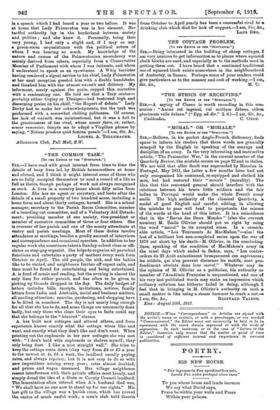" MORAL " OR "MORALE."
[To THE EDITOR OF THE "SPECTATOR."] SIR,—Bellows, in. his pocket Anglo-French dictionary, finds space to inform his readers that these words are generally misspelt by the English in speaking of the courage and discipline of an army. In the very interesting and instructive article, " The Peninsular War," in the current number of the Quarterly Review, the mistake occurs on page 22 and in italics. We are told that after Soult was superseded by Massena in Portugal, May 1811, the latter a few months later had not only reorganized his command, re-equipped and clothed his men, but had restored their " morale " (morality). The idea that this renowned general should interfere with the relations between his brave little soldiers and the fair ladies in Portugal would make the whole French army smile. The high authority of the classical Quarterly, a model of good English and careful editing, in allowing the mistake to pass will tend to perpetuate the misuse of the words at the head of this letter. It is a coincidence that in the "Revue des Deux Mondes " (also the current number) M. Emile 011ivier should put us right by using the word "moral" in its accepted sense. In a remark- able article, "Les Tourments de MacMahon."—alas ! the last of a brilliant but non-completed series upon the war of 1870 cut short by his death—M. 011ivier, in the concluding lines, speaking of the condition of MacMa.h on's army in the cruel days which ended in Sedan, says, " Les contre- ordres du 28 Aolit aneantissent brusquement ces esperances les soldats, qui n'en peuvent discerner les motifs, sont pro-. fondement atteints dans leur moral." Whatever may be the opinion of M. 011ivier as a politician, his authority as member of l'Academie Fransaise is unquestioned, and one of his very last published words may make an impression which ordinary criticism has hitherto failed in doing, although I feel that in bringing in M. 011ivier's authority on such a small matter is like using a steam hammer to crack a nut,*






































 Previous page
Previous page